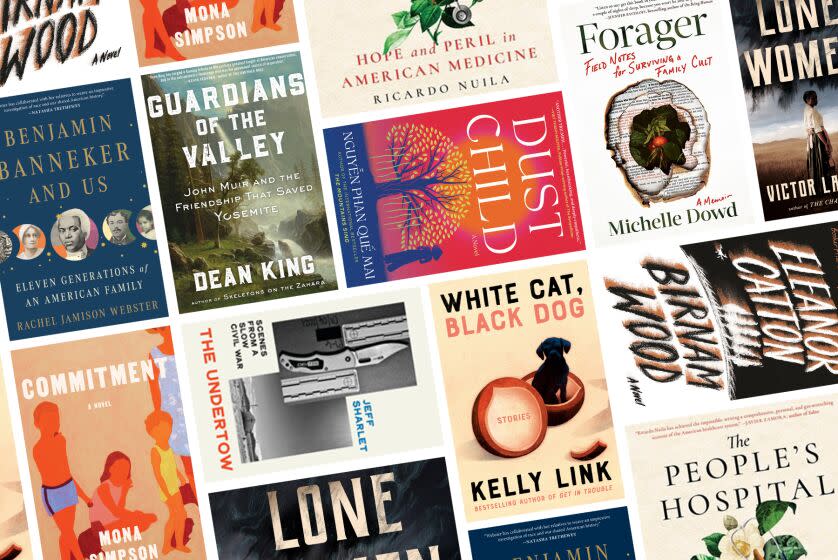10 books to add to your reading list in March

- Oops!Something went wrong.Please try again later.
- Oops!Something went wrong.Please try again later.
- Oops!Something went wrong.Please try again later.
Critic Bethanne Patrick recommends 10 promising titles, fiction and nonfiction, to consider for your March reading list.
This month brings wild stories of every variety — tales of foraging and magic, cults and crackups and deeply embedded social ills. Three of our March recommendations are set in national parks, two in hospitals that are no match for our broken healthcare system. Strong voices and convictions carry the day, as characters real and imagined fight for their environment, their families, their dignity or their survival. These common threads pull together mysteries, sagas, memoirs and histories. Whichever path you take, you’re in for a ride.
FICTION
Birnam Wood
By Eleanor Catton
FSG: 432 pages, $28
(March 7)
Shakespeare references, New Zealand’s mountain wilderness, a guerrilla gardening collective, an American billionaire building the ultimate doomsday bunker (or so he says). If that doesn’t intrigue, there’s the fact that Catton has followed up a Booker Prize-winning novel, “The Luminaries,” with an eco-thriller of grand psychological and social ambitions.
Dust Child
By Nguyen Phan Que Mai
Algonquin Books: 352 pages, $28
(March 14)
Mai’s American debut (after numerous books in her native Vietnam) was “The Mountains Sing,” a devastatingly poetic account of how political strife tore one family apart over generations. “Dust Child” now takes on the difficult subject of Amerasians left behind once the American military fled its own misadventures in Southeast Asia. Look for a reception akin to Min Jin Lee’s bestselling “Pachinko.”
Commitment
By Mona Simpson
Knopf: 416 pages, $30
(March 21)
Single mother Diane Aziz manages to get her son Walter settled at UC Berkeley before slipping into a depression that will land her in a California state hospital. Walter and his younger siblings, Lina and Donny, must determine not only how to take care of themselves (spoiler: with mixed results), but how to be a family without a parent. Simpson fills her seventh novel with wisdom, strength and humanity.
Lone Women
By Victor LaValle
One World: 304 pages, $27
(March 28)
If you haven’t read a LaValle novel, prepare to stock up. You’ll want more once you’ve sped through this propulsive concoction of genre tropes — from western themes to gothic twists. Adelaide has gone West to escape a mysterious crime, standing out as a single Black woman in white Montana — and keeping custody over a large trunk she insists stay locked at all times. LaValle combines chills with deep insights into our country’s divides.
White Cat, Black Dog: Stories
By Kelly Link
Random House: 272 pages, $27
(March 28)
Link is a genius, and not just according to the MacArthur Foundation. A small-press publisher, bookstore owner and producer of a zine, she consistently publishes stories that upend expectations. In her new collection, the author both reinvents and reclaims fairy tales, and the results are pure modern folklore — eccentric, taut and tapped into the collective subconscious. Dive in to meet Hansel and Gretel on a planet of vampires, as well as a cat who runs a weed dispensary.
…
NONFICTION
Forager: Field Notes for Surviving a Family Cult
By Michelle Dowd
Algonquin: 288 pages, $28
(March 7)
The Field was an extreme religious cult based in the Angeles National Forest, started in the 1930s by Michelle Dowd’s grandfather under the belief that “comfort and care” were sins, among many others, and that the proper state of living — at least until the imminent apocalypse — was a daily struggle for survival. In chapters centered on the edible plants she was forced to forage to avoid starvation, Dowd (now an academic and journalist) charts her path to freedom with remarkable clarity.
The People’s Hospital: Hope and Peril in American Medicine
By Ricardo Nuila
Scribner: 384 pages, $28
(March 14)
Nuila practices internal medicine in Houston at Ben Taub Hospital, but the doctor’s new book might take place in any big city where the uninsured — like the patients he chronicles here — face astronomical fees, mazes of endless paperwork and poor or insufficient diagnoses made by exhausted medical professionals. Nuila’s storytelling gifts place him alongside colleagues like Atul Gawande.
Benjamin Banneker and Us: Eleven Generations of an American Family
By Rachel Jamison Webster
Henry Holt: 368 pages, $29
(March 21)
Webster, a professor of creative writing at Northwestern, discovered that famed Black mathematician and astronomer Benjamin Banneker was a distant relative. This was a surprise for many reasons — not least of them that Webster is white. The conversations she had and the things she learned shone a light onto not just a neglected piece of personal and national history but also the hypocrisy inherent in so many discussions around race.
The Undertow: Scenes from a Slow Civil War
By Jeff Sharlet
W. W. Norton: 352 pages, $29
(March 21)
Sharlet, author of “The Family,” once again takes on politics and religion, those strange bedfellows the Constitution sought to keep apart, only to have their convergence shred our social fabric. Everywhere Sharlet travels, far-right politicians at every level goad crowds into paranoia and violence with ideas born from Christian Nationalism. But there is a different vision available, the author insists, one that leaves fear behind and embraces community.
Guardians of the Valley: John Muir and the Friendship that Saved Yosemite
By Dean King
Scribner: 480 pages, $30
(March 21)
King (“Skeletons on the Zahara”) follows the journey of two men to the Yosemite Valley — a trip that would convince them both to turn it into a national park. Environmentalist John Muir, who famously believed nature was cleaner than humanity, brought his much urbane editor at the Century Magazine, Robert Underwood Johnson, to see his beloved wilderness. Their complementary efforts — Muir the charismatic writer-lecturer, Johnson the politically connected pragmatist — changed (or rather saved) the American landscape.
This story originally appeared in Los Angeles Times.

